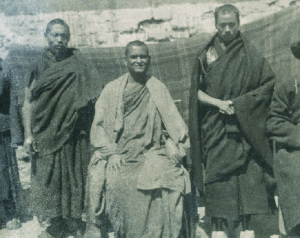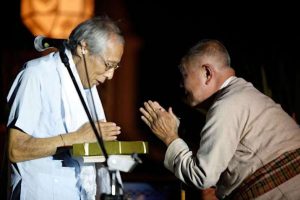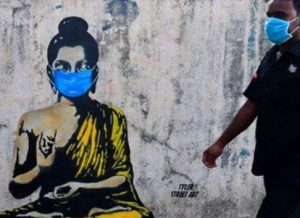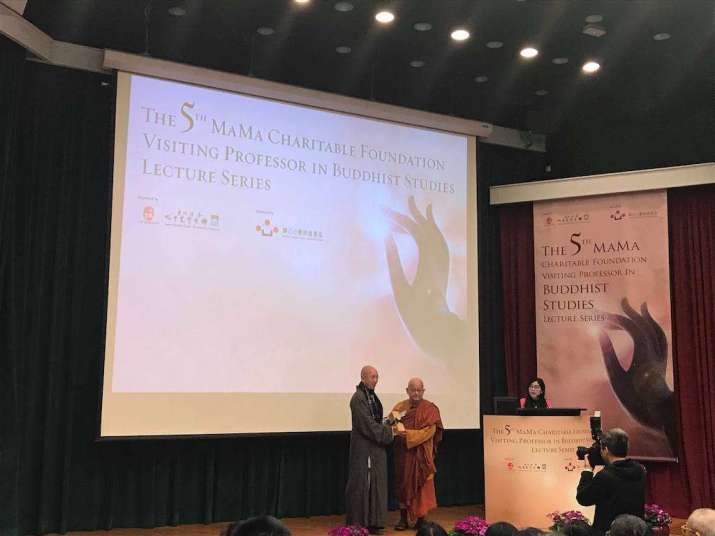
This month marks the fifth lecture series of the MaMa Charitable Foundation Buddhist Studies Lecture Series at The University of Hong Kong (HKU). HKU’s Centre of Buddhist Studies (CBS) has organized this lecture series annually since 2013, inviting scholars to speak so that the public, scholars, and students can benefit from their teachings. Ven. K. L. Dhammajoti, professor and chairman of the Buddha-Dharma Centre of Hong Kong, was the speaker this year.
Past lecture series have featured esteemed Sri Lankan scholar Prof. Y. Karunadasa; Lewis Lancaster, professor emeritus at the University of California, Berkeley; Silk Road specialist Roderick Whitfield, professor emeritus at the School of Oriental and African Studies (SOAS); and the meditation teacher and writer Prof. B. Alan Wallace.
As a PhD student at CBS, I was privileged to have a chance to attend every lecture series. Ven. Dhammajoti delivered three lectures on 20 and 27 January and 3 February, aimed at improving people’s understanding of Buddhist meditation, philosophy, psychology, and social advocacy.
Ven. Dhammajoti is a leading scholar in the study of the Sarvastivada Abhidharma. He is knowledgable in all the Buddhist scriptural languages, including Pali, Sanskrit, Classical Chinese, and Tibetan. In 2000, the University of Calgary conferred on him the prestigious Numata Chair of Buddhist Thought. Ven. Dhammajoti is also the editor of the internationally-renowned Journal of Buddhist Studies. In the last decade, he served at CBS as the Glorious Sun endowed professor in Buddhist Studies and continues to serve as honorary professor.
In his first talk on 20 January, Ven. Dhammajoti reflected on the nature of the Buddhadharma as a philosophy, as a psychology, as a way of life, and as a religion. He began his speech with the life of the Buddha, noting how he abandoned all his possessions for the sake of finding a path to liberation for all sentient beings. His talk came from a perspective of humanistic Buddhism because he said the Buddha dedicated his entire life to understand the nature of suffering and its cessation.
Ven. Dhammajoti’s second talk was titled: “Mind: Reactive and Creative,” and his third and final talk was on the Buddha’s moral philosophy. While the second lecture was on the nature of mind from the perspective of the Abhidharma, the third lecture covered the Buddha’s moral philosophy from the perspective of the suttas. Referring to several Pali suttas such as the Kalama Sutta in the Anguttara Nikaya and the Kakacupama Sutta in the Majjhima Nikaya, he framed the Buddha’s teachings as humanistic, non-theistic, and non-authoritarian.
Ven. Dhammajoti reflected on the Buddha’s teachings as a path of higher or spiritual evolution that depended on a fundamental change in the mind. He said that the Buddha never demanded his followers to follow him unquestioningly. Rather, he guided them to arouse their own mindfulness and free themselves from unwholesome thoughts.
Referring to the Kalama Sutta, Ven. Dhammajoti noted that modern writers claim the Buddha encouraged people undertake free investigation and not to accept anything with blind faith, implying that Buddhism is exempt from fanaticism, bigotry, dogmatism, and intolerance. However, he reminded his audience of an important passage of the Kalama Sutta that the Buddha equally emphasized: the objective of such inquiry is to gain an awareness that is ample, expansive, immeasurable, free from enmity, and free from mental ills. This, Ven. Dhammajoti said, is the true message that the Buddha conveys in the Kalama Sutta, which contemporary thinkers often overlook.
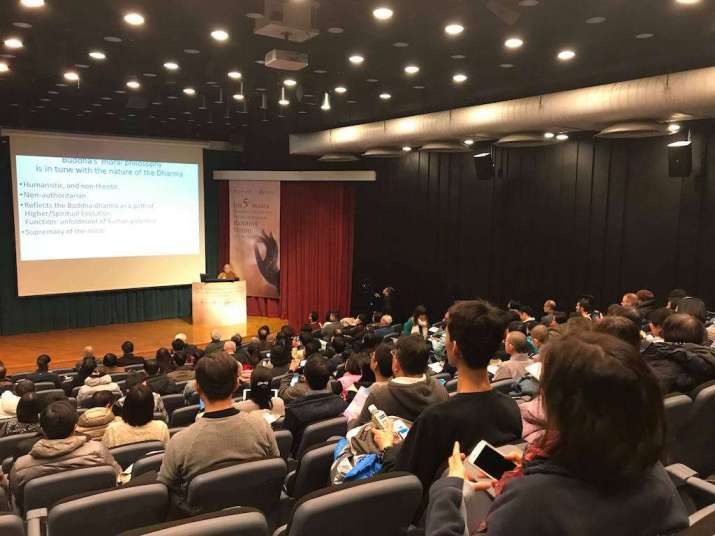
Alan Wallace, who has been teaching Buddhist meditation and philosophy worldwide since 1976, conducted the fourth lecture series in 2016, which covered the fields of health and psychology. The theme of the lecture series was, “A Buddhist View of Mindfulness and Consciousness.” Wallace delivered three lectures on Buddhist and psychological views of mindfulness, cultivating mental balance, and an empirical approach to the exploration of consciousness. He also conducted a five-day meditation retreat in Hong Kong. In 2014 and 2015, the third and second lecture series were organized with Roderick Whitfield, who spoke about “Buddhist Art in China: Transmission and Transformation,” and Lewis Lancaster, who talked about “Buddhism and Today’s Technology.”
The first lecture series in 2013 was given by Prof. Karunadasa, the then visiting professor of CBS, and it truly inspired hundreds of attendees. I still remember sitting at the back of the auditorium listening to Prof. Karunadasa address questions from the audience. I felt a surge of excitement when I listened to a medical student asking about the nature of consciousness when a person is in a coma, and the karmic consequences of wrongdoing by a mentally unstable person. Personally, I was very inspired and motivated by the topics of those lectures as I was—and am—interested in issues of religious fundamentalism, including questions of intolerance in Buddhist-majority countries such as Myanmar and Sri Lanka.
I believe that the MaMa Charitable Foundation Buddhist Studies Lecture Series can continute to draw upon scholars and students in Buddhist studies for possible speakers in future series. I also believe the MaMa Charitable Foundation could offer Buddhist teachings outside of academic institutions. Through such bold moves, future generations will be able to carry the Buddha’s teachings to a wider audience and more practitioners.
See more
MaMa Charitable Foundation Visiting Professorship in Buddhist Studies (Centre of Buddhist Studies, HKU)


